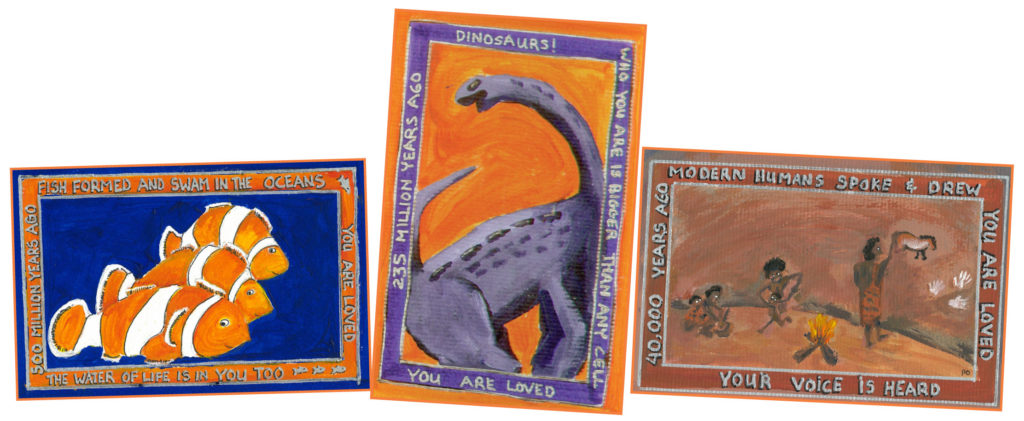
Sunday’s gospel comes from Jesus’ farewell to his disciples after the last supper. The image of the vine expresses the heart of Christian spirituality in John’s gospel. His disciples and the risen Jesus remain connected. Disciples live in Jesus, who is risen and alive in us.
The love of the risen Jesus sustains the Christian community. Disciples tap into the common vein of life that runs through the vine, branching throughout history and spreading throughout the world. Eight times in Sunday’s gospel Jesus repeats the word abide. It means to remain with, to continue in mutual relationship.
As disciples who believe God raised up Jesus from the dead, we bear fruit through living out our faith in God’s life-giving power and the promise of Jesus’ resurrection.
- How does Jesus’ vine image speak to you?
- What is an important way you use your capacity to love and give new life?
The Sundays of Easter explore the persisting friendship between the risen Jesus and his disciples. To reflect on the life we share, the lectionary provides us familiar images — last Sunday Jesus as a good shepherd, this Sunday Jesus as the vine and we its branches. No one image fully expresses the communion of life we share with Jesus and through Jesus with God.
In Jesus’ time shepherds shared the life of their sheep, camped outside at night to protect them, put their own bodies in the door of the sheepfold to keep them in, and put their own lives on the line for their sheep. Good shepherds persist and endure in their caring for their sheep, always present with them. Jesus, the good shepherd, embodies God’s steadfast love.
A vine is a single plant. All its branches share the life its roots draw from the soil and its leaves from the sun. A vine can spread extravagantly from its roots but one life flows through the whole plant. The branches abide on the vine.
Friendship with Jesus lasts into his risen life. It remains. Communion of life persists. The risen Jesus is at home in his disciples and they are at home with him. Jesus dwells or abides in them and they abide or dwell in him. We live in God’s love as Jesus does.
When Jesus says, “I am the vine,” he makes one of a series of “I am” statements in John’s gospel. John’s gospel proclaims in this way that Jesus is God.
The Christian community has grown over the centuries and throughout the globe, yet all of us Christians live from a common source and on a single vine. The vine is Jesus, who embodies divine love among us. The vine is an image of the communion of saints, living and dead, all of us who live in Jesus’ love and share God’s life as he does.
- In what relationships do you abide? How do these relationships help you understand your relationship with Jesus and with God?
The Father is the vine grower in Jesus’ vine analogy. The vine grower prunes the vines to bear more fruit or to remove branches that don’t bear fruit. Jesus explains that the word he teaches cleanses us. The same Greek word kathairie can be translated either cleanses or prunes, depending on the context.
The word catharsis comes from this same root and refers to an emotional or psychological cleansing. The Greeks regarded drama as healing because actors played out the effects of human pride or vengeance for the audience to experience and learn from vicariously.
Jesus’ words live in us and keep working in us to transform us. They have a continuing cleansing or converting effect.
- How has Jesus’ word had ongoing transformative effects in your life?
Today the gospel calls us to bear fruit in a world that is global and cosmic. The Second Vatican Council challenges us to make our own the joys and anxieties, the grief and anguish, of the poor and afflicted. This is a call to solidarity, to respond to the people of Earth as a common family. It is also an abiding ethical challenge in our market-driven society that measures success in wealth, not relationships.
Like a vine the principles of Catholic social teaching cross borders and boundaries with ease and extend the dignity of being made in God’s image and the rights of the human person to all. Care for the poor and care for Earth go hand in hand as Pope Francis insists in the exhortation Laudato Si’: Care for our Common Home.
We are all artisans of the common good. How we drive helps set the tone of the neighborhood. Our willingness to wear sweaters in winter saves heat. Our contributions save lives; our welcoming attitudes help immigrants resettle.
The Father vinegrower is the Creator of all that is. Like a vine unfolding from a single seed, evolution unfolds from the singular energy of the big bang. We humans are inextricably part of all that is. Our being alive is the gift and fruit of God’s irrepressible love, our call to love one another in return.
Our roots in Jesus’ life and love empower us to branch out and bear fruit where we live: to call others to faith in Jesus, to serve our families and communities, to make the small differences that build the common good.
- What fruit can the Church as a global vine bear in the world? How can you act in solidarity?
- What fruit do you produce on your branch of the vine?
